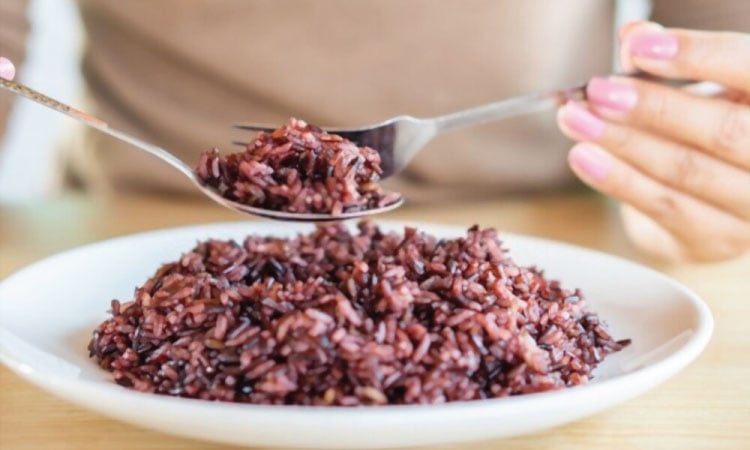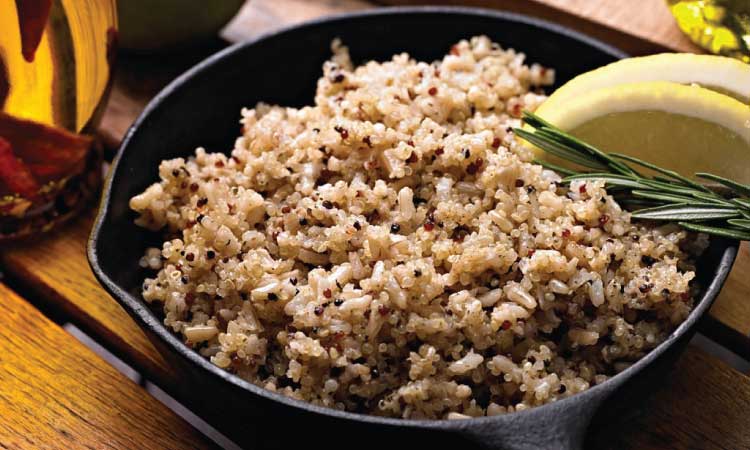Rice is a staple food for many, and there are multiple types of rice. So, it is no surprise if the doubt of whether or not it is safe to have brown rice during pregnancy arose in your mind.
This article will help you find answers to queries like “can we eat brown rice during pregnancy”, “what are the benefits of eating brown rice”, “what are the precautions you need to take”, and more.
What Is Brown Rice?
Unlike white rice, brown rice is unrefined and unpolished. It is also chewier than white rice. It is a whole grain and is made by ridding the rice kernel of just its hull.

Brown rice is more layered than white rice and is known for being a rich source of various important nutrients, such as magnesium, manganese, and selenium. This makes it very beneficial to consume brown rice during pregnancy, and is indeed a superfood during pregnancy, as long as it is consumed in moderation.
Nutritional Value Of Brown Rice
As mentioned above, brown rice is nutritionally dense. In addition to minerals like manganese, selenium, and magnesium, brown rice is also a rich source of dietary fiber.
It is also gluten-free, cholesterol-free, and trans-fat-free. It contains a relatively low number of calories and barely any fat and sodium. Brown rice is also a rich source of various antioxidants.
Why is Brown Rice Healthier Than White Rice?
When discussing brown rice, you will inevitable think about whether it is better to consume brown rice or white rice during pregnancy. There are indeed differences between the two, and here is why brown rice is healthier than white rice.
The production of brown rice involves removing only the hull (the outermost layer) of the rice kernel. This keeps most of its nutritional value intact. However, the production of white rice involves the removal of the germ layer and the bran.
Calculate Due Date With LMP
This causes the rice to lose:
- 80% of vitamin B1
- 67% of vitamin B3
- 90% of vitamin B6
- All the fiber and fatty acids
- 60% of iron
- 50% of manganese
- And 50% of phosphorus
This means that brown rice is much more nutritious and healthier than white rice.
Related Reading: 12 Amazing Health Benefits Of Eating Ragi During Pregnancy
Is It Safe To Eat Brown Rice During Pregnancy?

Having brown rice during pregnancy can be incredibly beneficial for you, as long as it is in moderation. You should not eat it every day or in very large amounts.
Also, there are a couple of serious side effects of brown rice during pregnancy that you should look out for:
- Brown rice is also a source of arsenic, which is very dangerous for both you and the foetus when consumed in large amounts
- If you are having brown rice for the first time, there is a possibility that you have an allergic reaction. So, you must look out for any discomfort or symptoms of allergy
What Are The Benefits Of Eating Brown Rice During Pregnancy?
Since brown rice is so rich in various nutrients, it is no surprise that there are many benefits to consuming it during pregnancy.
So here are a few notable benefits to eating brown rice during pregnancy:
1. Strengthens immune system
In the current scenario, immunity is one of the biggest concerns, brown rice is rich in various important antioxidants, such as selenium and zinc. These antioxidants are essential for the healthy functioning of the immune system. They help prevent several types of infections, speed up your body’s healing, and nourishes your body. Thus, having brown rice helps in strengthening & boosting your immunity during pregnancy.
2. Provides instant energy
Pregnancy is a time when fatigue and exhaustion are the norms. As such, it is important to eat energizing foods. Brown rice is a rich source of carbohydrates, which help to provide energy to your body.
Brown rice also contains niacin, which is a coenzyme that is essential for energy production. Additionally, we have shortlisted a few snacks to combat morning sickness and feel energized.
3. Helps maintain cholesterol
There are mainly two types of cholesterol: LDL, which is “bad” cholesterol, and HDL, which is “good” cholesterol. Brown rice contains an oil that can reduce the amount of LDL in your body while increasing the level of HDL. This helps maintain a healthy cholesterol level.
Moreover, brown rice itself is a cholesterol-free food. This makes it a healthy and beneficial addition to your pregnancy diet.
4. Helps with gestational diabetes
Brown rice has a low glycaemic content. It also has high amounts of insoluble fiber, phytic acid, and essential polyphenols. This helps maintains blood sugar levels. It also ensures a slower release of sugar. Thus, brown rice helps you prevent/combat gestational diabetes.
5. Prevents constipation
Constipation is one of the most common issues faced during pregnancy. Having brown rice during pregnancy can help prevent it.
Brown rice is a very rich source of dietary fiber. This fiber helps maintain healthy and regular bowel movements. It also makes you feel full, which, in turn, helps with proper digestion.
Brown rice also contains a good amount of resistant starch. This helps in the growth of the bacteria essential for smooth bowel movements.
Thus, having brown rice is a good way to get relief from constipation and other digestive issues during pregnancy.
6. Strengthens bones
Brown rice is rich in calcium, thiamine, and riboflavin. It is also rich in minerals like magnesium, and iron. These nutrients are all extremely important for the healthy growth, development, and maintenance of bones. Therefore, having brown rice helps to not only strengthen the mother’s bones, but also the foetuses.
7. Helps deal with mood swings

Pregnancy is a time when your hormones go haywire. So, it is no surprise that pregnant people experience frequent mood swings. This can be harmful to your quality of life.
Having brown rice during pregnancy can do wonders for your mental health. It reduces the effects of depression and fatigue, as well as mood disturbances. It can help regulate changes in your mood. It also reduces your stress levels.
Hence, having brown rice helps you deal with your mood swings, making you have a healthier, happier pregnancy.
Related Reading: 15 Tried And Tested Ways To Handle Emotions During Pregnancy
8. Helps combat insomnia
Brown rice is a source of melatonin. It is a sleep hormone that can relax your nerves and provide a good night’s sleep. Thus, eating brown rice can help you get sufficient rest, and combat the causes of sleep deprivation.
It will also lead to lesser mood swings and depression.
9. Maintains blood pressure
High blood pressure is not only one of the most common issues faced by pregnant people, it is also one of the most dangerous. High blood pressure can lead to several complications and is a threat to both your and your baby’s health.
Brown rice contains a very low amount of sodium. This means that having brown rice during pregnancy, and during other times, can help regulate your blood pressure and bring it down to a healthy level. This will make for a much safer pregnancy and delivery.
10. Controls body weight
Pregnancy is a time when it is usually very easy to gain a lot of weight, even without you meaning to. Being overweight during pregnancy can lead to many complications that are dangerous for you and your baby.
Having brown rice is a great way to regulate the rate at which you gain weight. Brown rice is very low in calories. Therefore, it does not make you gain weight very quickly, like other foods might.
Additionally, brown rice also makes you feel full for a longer amount of time.
11. Prevents urogenital issues
Urogenital infections are very common during pregnancy. It can also have very harmful effects on you and your baby. So, it is important to do what you can to prevent it. Brown rice helps you do that.
It is a natural diuretic. This means that it can increase the number of times you urinate, which helps prevent urogenital issues.
12. Baby’s growth and development
Brown rice is rich in various neurotransmitter nutrients. These are essential for the proper growth and development of the baby’s brain and nervous system. It can even benefit them in their future cognitive functions. Hence, having brown rice during pregnancy can help with your baby’s growth and development.
Related Reading: 12 Best Foods For Baby Brain Development
Precautions When Eating Brown Rice During Pregnancy
Despite being so beneficial, it is important to take a few precautions when having brown rice during pregnancy. This can help you get the full benefits of brown rice with a reduced risk of side effects.
- Make sure you take note of the expiry date. Brown rice contains natural oils that can go stale after some time
- After you cook the rice, make sure you store it carefully. Storing it incorrectly can encourage the growth of harmful bacteria that can cause food poisoning, whether or not you reheat it. So, make sure you do not store it at room temperature or reheat multiple times
- Cooking your brown rice in 6 times the normal amount of water used for cooking rice is a great way to reduce the arsenic level. It cuts down on the arsenic by about half
Conclusion

When adding any new food to your pregnancy diet, it is important to take careful note of its benefits and negative effects. Brown rice is a wonderfully helpful food item for pregnant women, but only when it is eaten in moderation.
Also, it is important to always try to buy the organic version that is free of dangerous pesticides. Make sure you do not eat raw rice, despite any cravings you might have, as it can be harmful to you and your baby. And of course, if you find that you are facing any negative side effects, take the proper remedies and contact your doctor immediately.
As long as you do that, eating brown rice during pregnancy will ensure you have a happier, healthier, safer time.
FAQs
Selecting: Brown rice can be found at just about any grocery store. However, it is recommended that you specifically choose organic brown rice during pregnancy, as it has less arsenic.
Storing: Make sure you store brown rice in an airtight container. It should not be kept in an environment with very high temperatures. It should also be kept away from moisture and light. If you follow these guidelines, your brown rice will have a shelf life of about 6 months.
Since brown rice is more layered than white rice, it requires more water and a longer cooking time.
First things first, it should be thoroughly washed multiple times under running water. Make sure there is no dirt or debris in the rice.
To cook it properly, add one part rice and two to three parts of water. So, for one cup of rice, add about 2 ½ to 3 cups of water. Wait for it to boil, then turn down the heat and cover it. Let it simmer for about 45 minutes. And voila! Your rice is done.
If you soak the brown rice beforehand, the cooking time will be reduced.
